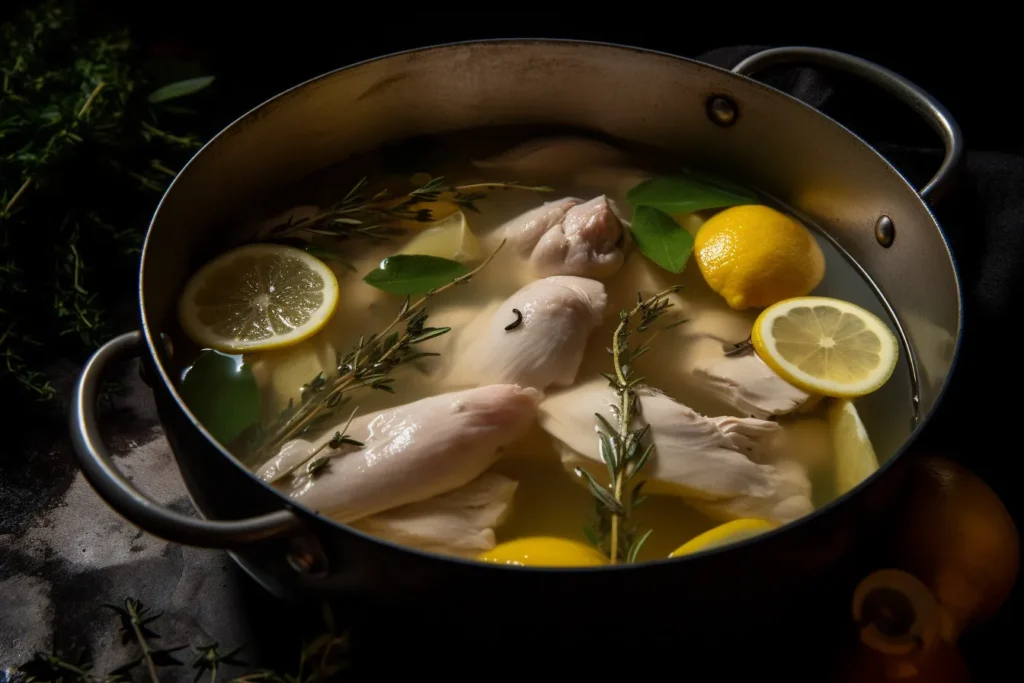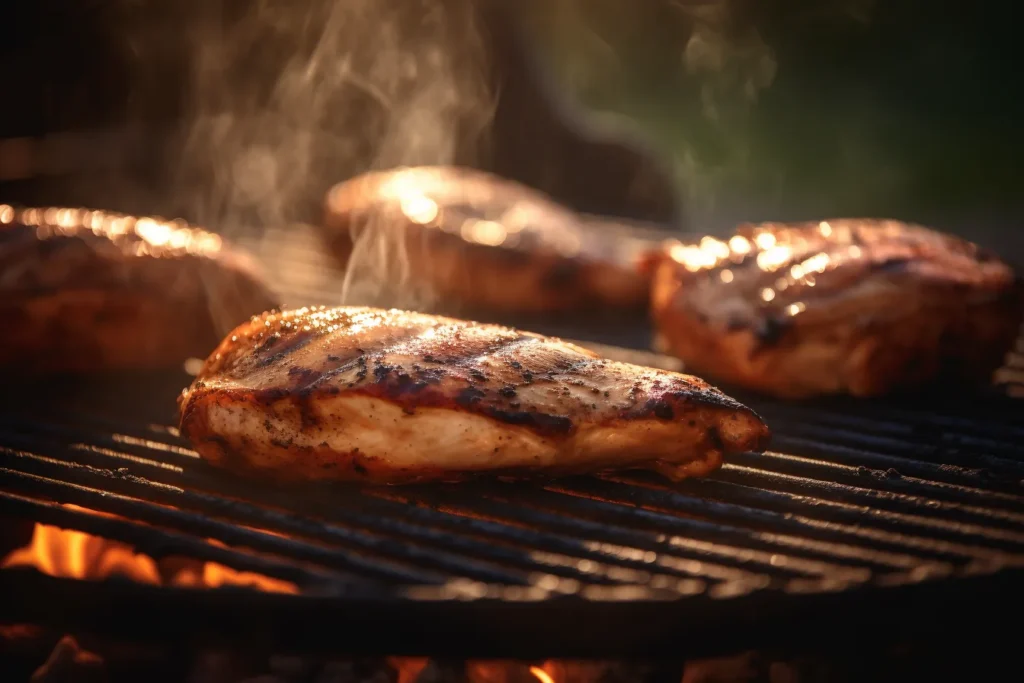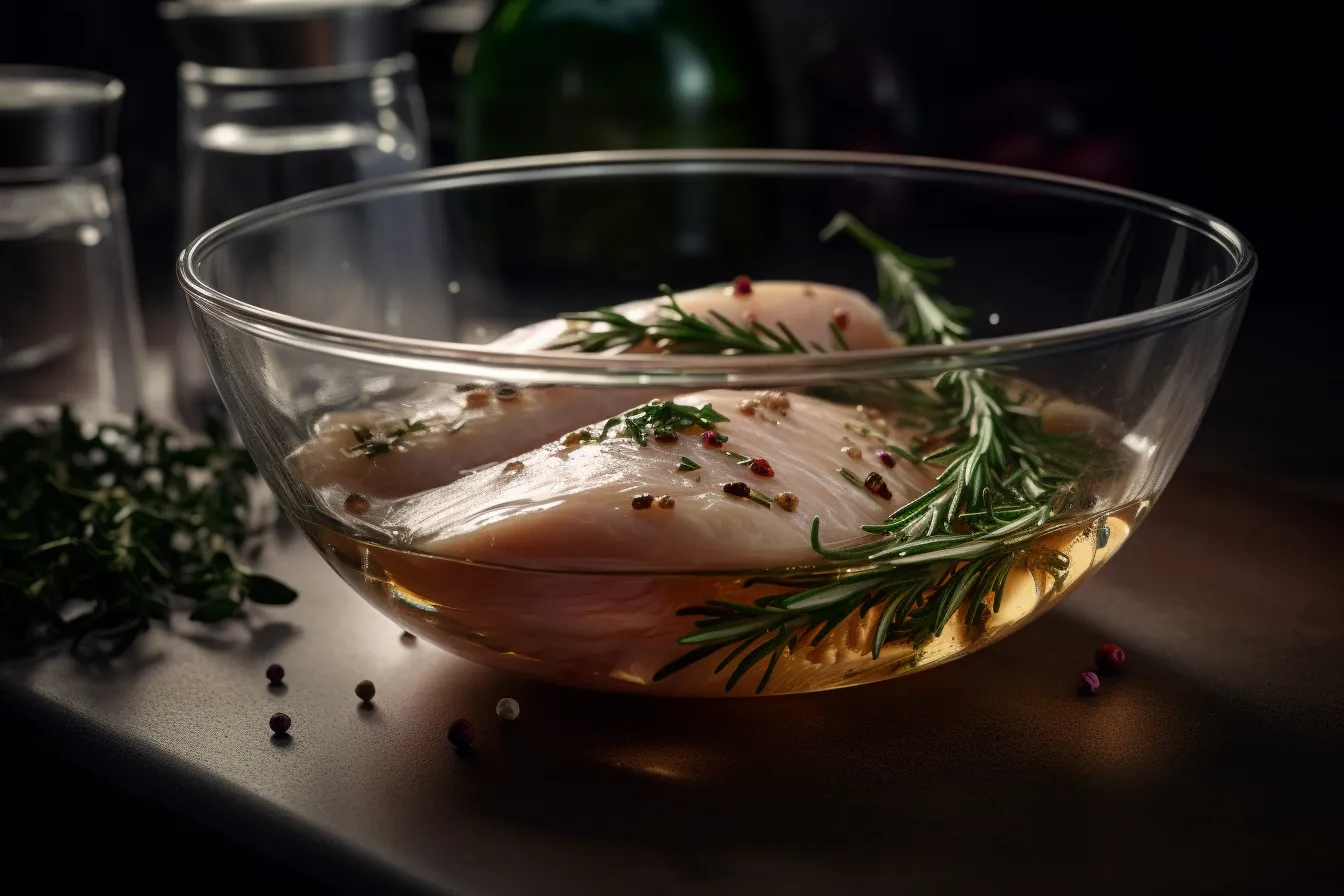Introduction
When preparing chicken, many home cooks and chefs alike wonder, “What does vinegar do to chicken when cooking?” The answer lies in the unique properties of vinegar, which play a key role in transforming the texture and flavor of chicken. Whether you’re marinating chicken for grilling, baking, or pan-frying, vinegar acts as a secret weapon that tenderizes the meat and infuses it with subtle tanginess.
But how does it work? Vinegar, a highly acidic ingredient, breaks down the proteins in the chicken, resulting in a more tender and juicy texture. In addition to its tenderizing effect, vinegar enhances the flavor of chicken by allowing spices, herbs, and seasonings to penetrate more deeply. As a result, your chicken turns out both flavorful and succulent.

Why Vinegar is a Game-Changer for Chicken
Vinegar is more than just a pantry staple; it’s a versatile ingredient that elevates your cooking. For example, in marinades, vinegar creates a perfect balance of acidity, which softens the meat while keeping it moist. Additionally, vinegar works with other ingredients like olive oil, garlic, and herbs to create complex flavors that enhance even the simplest chicken recipes.
Many types of vinegar can be used, depending on the desired taste. For instance:
- White vinegar offers a sharp, clean tang.
- Apple cider vinegar adds a slightly sweet and fruity note.
- Balsamic vinegar brings a rich, sweet complexity, ideal for glazes.
In short, vinegar is an essential ingredient that doesn’t just improve chicken’s texture—it transforms the dish into something extraordinary.
Practical Tips for Cooking Chicken with Vinegar
If you want to maximize the benefits of vinegar while cooking chicken, a few key tips can help you achieve tender, flavorful results every time. By balancing acidity, marinating effectively, and pairing ingredients carefully, you’ll elevate even the simplest chicken dishes.
Choose the Right Vinegar
Not all vinegars work the same way in cooking. Selecting the right variety will determine the final flavor of your dish. For example:
- White vinegar: Great for tenderizing quickly due to its sharp acidity.
- Apple cider vinegar: Adds a mild tang with a hint of sweetness, perfect for marinades.
- Balsamic vinegar: Creates a thick, caramelized glaze that’s ideal for roasting or finishing sauces.
- Rice vinegar: A milder option, commonly used in Asian-inspired dishes.
Tip: For a complex flavor, combine two types of vinegar—like balsamic for sweetness and white vinegar for tang—when marinating.
Avoid Over-Marinating
While vinegar tenderizes chicken beautifully, marinating for too long can make the meat mushy. Acidity breaks down proteins, but overexposure can harm the texture.
Tip: For best results, marinate chicken for 30 minutes to 4 hours. Thin cuts need less time, while thicker cuts like thighs can go a bit longer.
Balance Acidity with Other Ingredients
Acidity alone can be overpowering, so pairing vinegar with the right ingredients ensures a well-rounded flavor. Olive oil, honey, or yogurt works particularly well with vinegar.
- Olive oil: Adds moisture and prevents drying during cooking.
- Honey or brown sugar: Balances the tangy vinegar with a touch of sweetness.
- Garlic and herbs: Ingredients like rosemary, thyme, or paprika add depth and aroma to the dish.
Tip: Combine vinegar, olive oil, and a bit of honey for a quick, balanced marinade that works for grilling, baking, or pan-searing.

Cook with the Right Technique
The way you cook chicken with vinegar matters just as much as the marinade. To get the best results, follow these simple cooking techniques:
- For skillet cooking: Heat the pan properly before adding the chicken to ensure a good sear and lock in the juices.
- For baking: Pour leftover marinade over the chicken while cooking. The vinegar will reduce, creating a flavorful glaze.
- For grilling: Brush the chicken with marinade throughout cooking to add layers of flavor.
Tip: To prevent the balsamic glaze from burning, cook at medium heat and add the glaze during the final minutes.
Deglaze the Pan for Extra Flavor
Vinegar isn’t just for marinating—it works beautifully during the cooking process as well. Adding a splash of vinegar to the skillet when the chicken is almost done helps deglaze the pan. This lifts any caramelized bits stuck to the bottom, creating a quick and flavorful sauce.
Tip: For a richer sauce, whisk in a small amount of butter or cream after reducing the vinegar.
Use Vinegar for Leftover Chicken
If you have leftover chicken that feels dry, vinegar can bring it back to life. Toss the chicken in a small amount of vinegar-based sauce or glaze. The acidity refreshes the meat, making it moist and flavorful again.
Tip: Mix a teaspoon of balsamic vinegar with olive oil and herbs to create a quick dressing for shredded leftover chicken.
Experiment with Poaching or Glazing
Beyond marinating, vinegar can be used in creative ways during cooking. For instance:
- Poaching: Add a tablespoon of vinegar to broth or water when poaching chicken. It enhances tenderness and adds subtle tanginess.
- Glazing: Create a finishing glaze by combining balsamic vinegar with honey or brown sugar. Brush it onto the chicken during the last few minutes of baking for a glossy, caramelized finish.
Tip: A balsamic and honey glaze works especially well for baked or grilled chicken thighs.
Key Takeaways
To get the most out of vinegar when cooking chicken, focus on these simple yet effective tips:
- Choose the right vinegar based on the flavor you want to achieve.
- Marinate the chicken for just the right amount of time—no longer than 4 hours.
- Balance vinegar with olive oil, honey, and herbs for a well rounded marinade.
- Deglaze the pan with vinegar to create quick and flavorful sauces.
- Use vinegar creatively for poaching, glazing, or refreshing leftover chicken.
By incorporating these practices, you’ll not only tenderize your chicken but also unlock bold, delicious flavors that elevate your dishes.

Practical Tips for Cooking Chicken with Vinegar
If you want to maximize the benefits of vinegar while cooking chicken, a few key tips can help you achieve tender, flavorful results every time. By balancing acidity, marinating effectively, and pairing ingredients carefully, you’ll elevate even the simplest chicken dishes.
Choose the Right Vinegar
Not all vinegars work the same way in cooking. Selecting the right variety will determine the final flavor of your dish. For example:
- White vinegar: Great for tenderizing quickly due to its sharp acidity.
- Apple cider vinegar: Adds a mild tang with a hint of sweetness, perfect for marinades.
- Balsamic vinegar: Creates a thick, caramelized glaze that’s ideal for roasting or finishing sauces.
- Rice vinegar: A milder option, commonly used in Asian-inspired dishes.
Tip: For a complex flavor, combine two types of vinegar—like balsamic for sweetness and white vinegar for tang—when marinating.
Avoid Over-Marinating
While vinegar tenderizes chicken beautifully, marinating for too long can make the meat mushy. Acidity breaks down proteins, but overexposure can harm the texture.
Tip: For best results, marinate chicken for 30 minutes to 4 hours. Thin cuts need less time, while thicker cuts like thighs can go a bit longer.
Balance Acidity with Other Ingredients
Acidity alone can be overpowering, so pairing vinegar with the right ingredients ensures a well-rounded flavor. Olive oil, honey, or yogurt works particularly well with vinegar.
- Olive oil: Adds moisture and prevents drying during cooking.
- Honey or brown sugar: Balances the tangy vinegar with a touch of sweetness.
- Garlic and herbs: Ingredients like rosemary, thyme, or paprika add depth and aroma to the dish.
Tip: Combine vinegar, olive oil, and a bit of honey for a quick, balanced marinade that works for grilling, baking, or pan-searing.
Cook with the Right Technique
The way you cook chicken with vinegar matters just as much as the marinade. To get the best results, follow these simple cooking techniques:
- For skillet cooking: Heat the pan properly before adding the chicken to ensure a good sear and lock in the juices.
- For baking: Pour leftover marinade over the chicken while cooking. The vinegar will reduce, creating a flavorful glaze.
- For grilling: Brush the chicken with marinade throughout cooking to add layers of flavor.
Tip: To prevent the balsamic glaze from burning, cook at medium heat and add the glaze during the final minutes.
Deglaze the Pan for Extra Flavor
Vinegar isn’t just for marinating—it works beautifully during the cooking process as well. Adding a splash of vinegar to the skillet when the chicken is almost done helps deglaze the pan. This lifts any caramelized bits stuck to the bottom, creating a quick and flavorful sauce.
Tip: For a richer sauce, whisk in a small amount of butter or cream after reducing the vinegar.
Use Vinegar for Leftover Chicken
If you have leftover chicken that feels dry, vinegar can bring it back to life. Toss the chicken in a small amount of vinegar-based sauce or glaze. The acidity refreshes the meat, making it moist and flavorful again.
Tip: Mix a teaspoon of balsamic vinegar with olive oil and herbs to create a quick dressing for shredded leftover chicken.
Experiment with Poaching or Glazing
Beyond marinating, vinegar can be used in creative ways during cooking. For instance:
- Poaching: Add a tablespoon of vinegar to broth or water when poaching chicken. It enhances tenderness and adds subtle tanginess.
- Glazing: Create a finishing glaze by combining balsamic vinegar with honey or brown sugar. Brush it onto the chicken during the last few minutes of baking for a glossy, caramelized finish.
Tip: A balsamic and honey glaze works especially well for baked or grilled chicken thighs.

